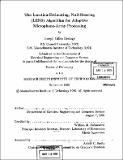The location-estimating, null-steering (LENS) algorithm for adaptive microphone-array processing
Author(s)
Desloge, Joseph Gilles
DownloadFull printable version (12.35Mb)
Advisor
William M. Rabinowitz.
Terms of use
Metadata
Show full item recordAbstract
This document develops and evaluates the Location-Estimating, Null-Steering (LENS) algorithm for adaptive array beamforming in the case of a. known target location. Such beamformers are useful in spatial-filtering applications that enhance a desired target source while attenuating non-target, jammer sources in a given environment. Although LENS is designed for general beamforming purposes, this document emphasizes the use of LENS to create a background-noise-reducing hearing aid. LENS processing is innovative in that it uses a novel robustness-control mechanism to yield a beamformer that avoids target cancellation under adverse conditions. Most traditional beamforming systems realize robustness control through the use of constraints in the beamforming optimization, which is an approach that is both indirect and difficult to understand. LENS, on the other hand, achieves direct and obvious robustness control by separating robustness control from the beamforming optimization in the following two-step procedure: first it solves a minima.By-constrained beamforming optimization in terms of the LENS parameter set [beta]_oct , and then it evaluates and ... The advantages of LENS processing are not limited to improved system robustness, however. Its design allows implementation using a relaxation-based approximation to direct-solution LENS procGssing (the LENS equiwdent of direct covariance matrix inversion processing for traditional systems). Simulations demonstrate that this relaxation-based implementation can combine efficient implementation, fast beamformer adaptation, and good beamforming performance, which is difficult to achieve with traditional systems.
Description
Thesis (Ph. D.)--Massachusetts Institute of Technology, Dept. of Electrical Engineering and Computer Science, 1998. Includes bibliographical references (p. 219-221).
Date issued
1998Department
Massachusetts Institute of Technology. Department of Electrical Engineering and Computer SciencePublisher
Massachusetts Institute of Technology
Keywords
Electrical Engineering and Computer Science